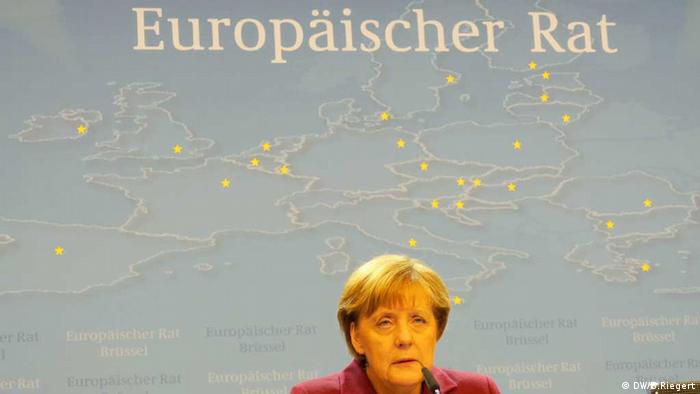Opinion: Merkel is part of the problem
Opinion: Merkel is part of the problem
For a long time now the German Chancellor has been regarded as the great authority within Europe. But her refugee policy has turned her into a burden for the Union, writes DW's Christoph Hasselbach.
Does any other topic actually exist in the EU besides refugees? For years the Union held its breath over the national debt crises, the fate of Europe apparently in the balance. The topic is still very much on the agenda, as shown by recent reports that the creditors are delaying the payment of further funds to Greece because the country is dragging its feet over the implemention of reforms. Consideration of Greece, however, also highlights something else: Within just a few weeks, German Chancellor Angela Merkel's standing in Europe has dramatically decreased.
During the debt crisis, Merkel earned herself considerable authority. She stood for abiding by the rules, for solidarity – and also for working to ensure European cohesion. Where necessary, she was ready to compromise in order to achieve this. Her politics of stability weren't to everyone's liking. But even many of her critics accepted that the medicine dispensed by "Mother Merkel" was good.
Making others liable
Until late this summer, that is, when Merkel reacted to the incoming flow of refugees with two disastrous sentences: "There is no upper limit" and "We can cope." She still stands by these assertions. They were accompanied by selfies with refugees, and a unilateral decision to stop abiding by the Dublin regulation. In Merkel's eyes, building fences to keep refugees out is not only futile but reprehensible. She accepted the state's loss of control over its borders with a mere shrug of the shoulders. And as if all that weren't enough, she stood up in front of all the other Europeans and declared her personal view of things to be the only one that was morally right.
In other words: Germany's European partners should help it deal with the consequences of a policy for which Merkel is significantly responsible. No one claims that Merkel is responsible for the refugee movement per se – but she has certainly increased the pull towards Europe, and in doing so has made other countries liable, too, against their will.
German arrogance
And there it was again, that German arrogance – albeit in a noble cause. Ever since, Merkel has encountered icy rejection in her meetings with her European colleagues. Her few supporters, such as French president François Hollande, are now just paying lip service. Hungary's prime minister, Viktor Orban, has even openly declared the stream of refugees "a German problem" and is cutting his country off. Following Poland's swing to the right, Merkel can't expect concessions from there any more, either. Even Sweden's head of state, Stefan Löfven, is coming under pressure at home to close the borders. With all of this going on, there can be no more talk of European solidarity. Everyone is trying to save themselves – at others' expense, if need be.
However much the Chancellor believes she's morally in the right, on European refugee policy she is isolated. She was able, for the most part, to push through her views on economic policy because it was a policy the majority of Europeans believed in, even though it was painful. But not only are the majority in Germany opposed to her ideas about accepting an unlimited number of refugees, a considerable majority also oppose her in Europe, and have done for some time. Ultimately, there is no policy that will help with this. Merkel's personal tragedy is that she is in the process of gambling away the significant authority she had built up for herself in Europe.


Comments